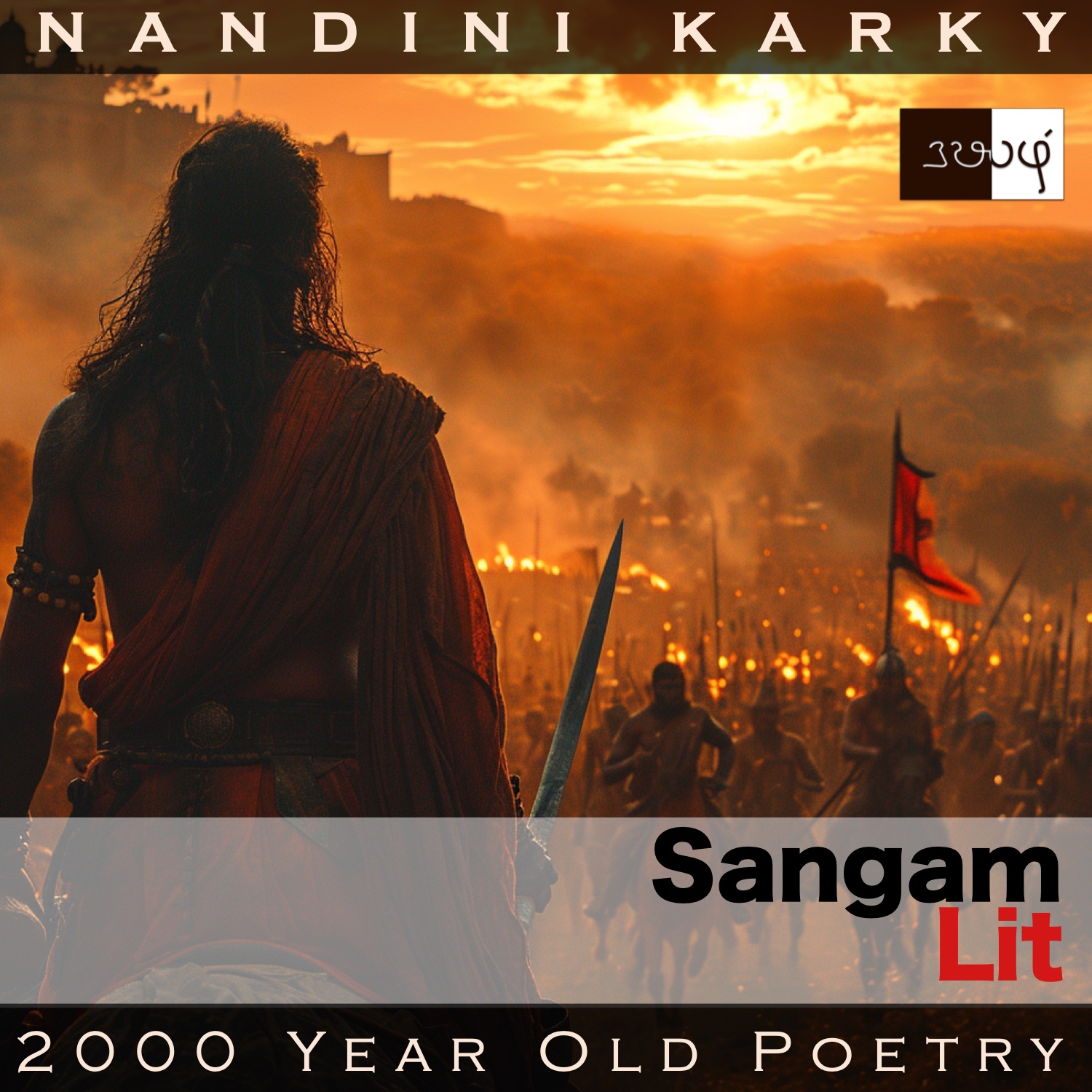Podcast: Play in new window | Download
Subscribe: Apple Podcasts | Spotify | Amazon Music | Android | iHeartRadio | Email | TuneIn | RSS | More
In this episode, we perceive admiration for a foe, as portrayed in Sangam Literary work, Puranaanooru 303, penned by the poet Erumai Veliyanaar. Set in the category of ‘Thumbai Thinai’ or ‘Battle of two kings’, the verse paints a dual portrait of warriors from opposing camps.

நிலம் பிறக்கிடுவது போலக் குளம்பு குடையூஉ,
உள்ளம் அழிக்கும் கொட்பின் மான்மேல்
எள்ளுநர்ச் செகுக்கும் காளை கூர்த்த
வெந் திறல் எஃகம் நெஞ்சு வடு விளைப்ப
ஆட்டிக் காணிய வருமே நெருநை,
உரைசால் சிறப்பின் வேந்தர் முன்னர்,
கரை பொரு முந்நீர்த் திமிலின் போழ்ந்து, அவர்
கயந்தலை மடப் பிடி புலம்ப,
இலங்கு மருப்பு யானை எறிந்த எற்கே.
It’s the flag of soldiers fluttering high in this series of Sangam verses. The poet’s words can be translated as follows:
“As if pushing the very ground behind, with hooves drilling into the land, with a fierceness that disheartens many, riding a swift horse, comes the bull-like young man, who intends to destroy enemies, who dare laugh at him, wielding his sharp and sturdy spear and wounding the chests of many. He, who comes shaking his spear with such terror for all to see, rides to attack the person who, yesterday, before great and famous kings, akin to a ship that splits the roaring waves of the ocean, killed many a male elephant with shining tusks, making their soft-headed, naive female mates lament. And, that person is me!”
Let’s delve deeper into this curious verse. Instead of starting from the beginning as we always do, let’s start from the last line of the verse, from which we gather that the poet is speaking in the voice of a soldier from one camp, let’s call him ‘Camp A soldier’. This ‘Camp A soldier’ says only yesterday he killed and heaped male elephants, which is a sort of a continuity from the previous Puranaanooru verse 302. Camp A soldier further adds that this makes the naive female elephants weep and lament the loss of their mates. This must be a poetic projection because when elephants are taken away from the wild and trained to become battle beasts, I doubt that their mates are brought along for company. A likely poetic license, no doubt! Returning, our camp A soldier describes the manner in which he performed this brave task of killing enemy elephants and compares it to the way a ship tears the waves of the ocean, symbolising the vast army of the enemies, whom we shall call as ‘Camp B’.
Now, this ‘Camp A soldier’ sketches the way a ‘Camp B soldier’ rides saying it’s as if the land is pushed backwards, as the hooves of the soldier’s horse press so forcefully into the ground. He comes riding with such fierceness, intending to slay anyone who underestimates him and the sharp shear in his hand is ready to pierce the chests of enemies many, this camp A soldier adds. And finally, the poet, still speaking in the voice of the ‘Camp A soldier’ concludes saying this dashing ‘Camp B soldier’, with a threatening spear in hand, comes with such determination just to attack our narrator, the ‘Camp A soldier’ and killer of ‘Camp B’ male elephants!
A verse in which you cannot help noticing the words of admiration for the enemy! Although there is so much pride and confidence in the voice of our ‘Camp A soldier’ at his actions of yesterday, at the same time, you can read the respect for the stance and intention of the enemy, the ‘Camp B soldier’. True that it’s hard to understand the priorities of these ancients! However, if we reflect deeply, we can understand that perhaps more than anything else, the soldiers desired worthy opponents in their fights, which was their work and world in that ancient past!




Share your thoughts...